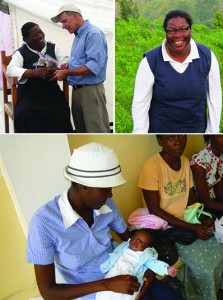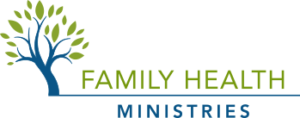Carmelle Voltaire
Women’s Health Center

located in Tom Gato, Haiti, serving the Fondwa & Cormier watersheds
The Carmelle Voltaire Women’s Health Care Center was built in 2016 with a grant from Building Goodness Foundation, responding to community surveys that FHM conducted to discover unmet health care needs in the Leogane commune. of unmet health care needs in Leogane. Haiti has the highest estimated maternal mortality and infant mortality rate in the Western hemisphere, at 350 / 100,000. For expecting mothers in the rural mountains of Haiti, there are many uncertainties. Women are often in labor at home with only family in attendance. Many women do not know what to expect during labor and without skilled birth attendants, women labor for hours alone with no medication or even the comforts of indoor running water. Should the mother need medical attention, she would most likely be carried on a wood plank, such as a door, from her home for miles on winding steep paths to the nearest road. Once on the main road, hopefully, a passerby or a tap-tap (local transportation) will stop to take her to the next town that may or may not have a hospital. Many women have complications during childbirth that result in fatality for themselves and/or their infants.
For this reason, FHM partnered with the Building Goodness Foundation to build a birthing and education center in Tom Gato. Our goal is to increase safe delivery of Haitian infants, to reduce maternal and child birth-related deaths, and to expand access to skilled birth attendants for the rural community.
The new FHM women’s health clinic is named after Sister Carmelle Voltaire, who died in March 2012, at age 49. She provided many years of dedicated service to the people of Fondwa, Haiti. Sister Carmelle was a nurse, caregiver and the spiritual leader of the nuns and nuns in training. She was a dear friend and cherished partner of Family Health Ministries. Sister Carmelle is dearly missed by her friends at Family Health Ministries, by all the Sisters that she led in ministry, and by the Fondwa families she served. It is FHM’s hope that the work that Sister Carmelle began years ago will continue in this facility named in her memory.
The Carmelle Voltaire Women’s Health Center is managed by skilled Haitian birth attendants and midwives. Haitian midwives in collaboration with US midwives provide educational programs to improve the skills of the traditional birth attendants who have been the only source of care in this mountain area for years. The traditional birth attendants serve as community outreach partners who monitor pregnant women in the community for such issues as elevated blood pressure, signs of preterm labor, and other pregnancy complications. Women who are identified as needing further evaluation will be referred to the birthing and education center, where an OB/GYN physician is available during the week for consultation and referral. To ensure that the traditional birth attendants do not lose their sense of community and their financial income, there is a financial incentive given for accompanying a patient to deliver at the birthing center under the assistance of a skilled midwife.
Facility
The Carmelle Voltaire Women’s Health Center is a 4000-square-foot facility. The first floor includes a waiting room, office space, four exam rooms, clean and dirty utility rooms, two bathrooms, two delivery rooms, a nursery, and a pharmacy. The second floor provides a guesthouse for visitors, additional restrooms, a large educational space, and storage.
Target Population
The target population for these services is indigent Haitian women of childbearing age with limited access to prenatal care. It is estimated the community surrounding the birthing center has approximately 20,000 women, of whom 56% are 15-54 years of age. This means that the clinic has the potential to provide outreach, education, and direct services to approximately 11,200 women in the community of Tom Gato in the Fondwa area. It is difficult to project monthly utilization, but our experience in a similar size community allows us to estimate utilization of 150-200 patients a month. This would include patients receiving education, prenatal care, and delivery services. All permanent birthing center staff are Haitian.
